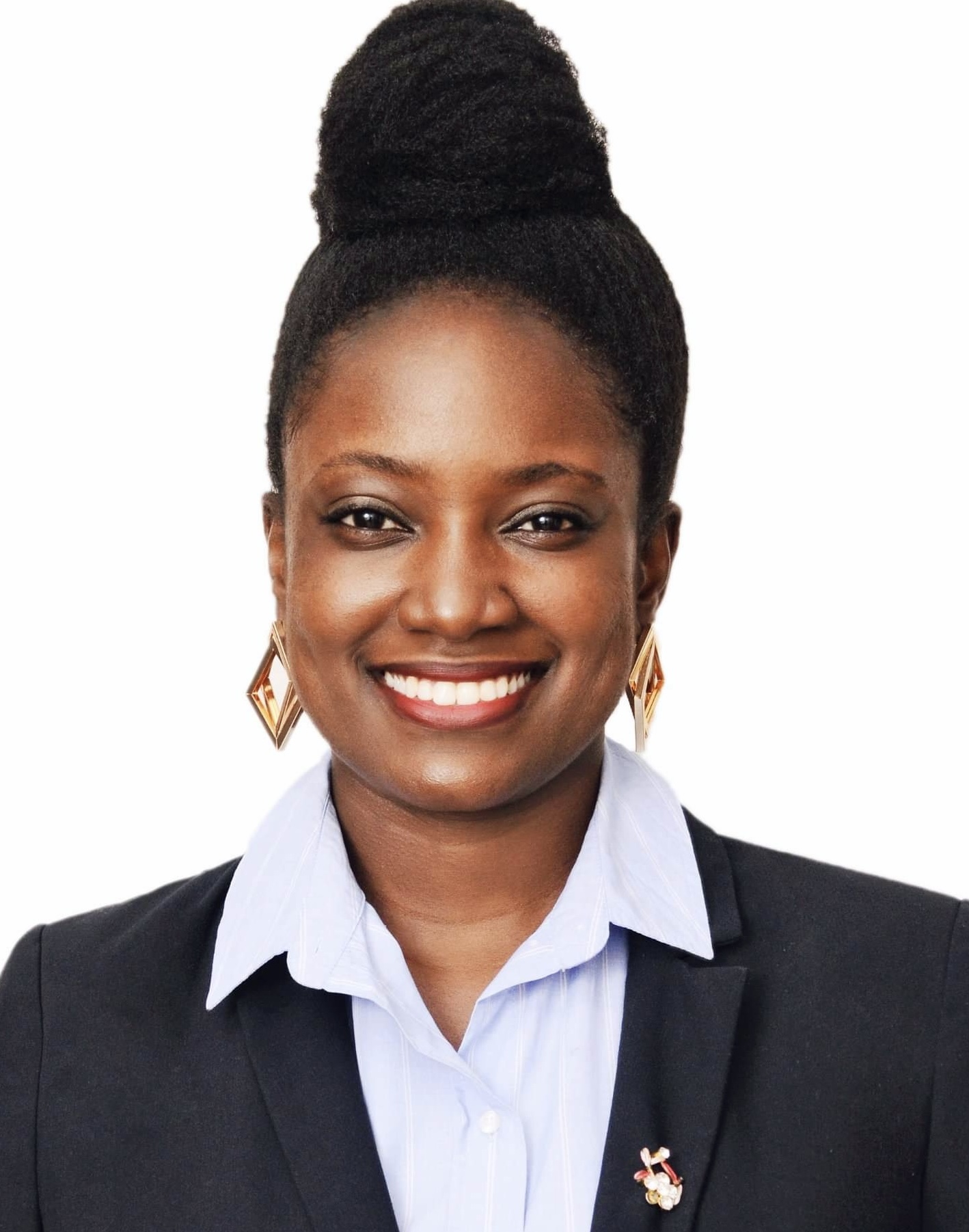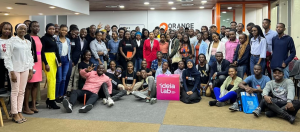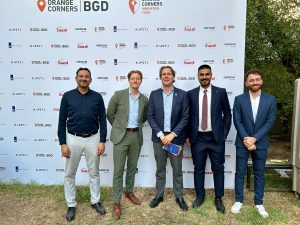A close cooperation between the Dutch and local government, a local implementing partner and international, Dutch and local private partners is instrumental to the success of Orange Corners. As the bridge between the Netherlands and our partner countries, our embassies play a key role in bringing together international coalitions to boost youth entrepreneurship. During her visit to Ghana our travelling reporter spoke to Maame Awinador-Kanyirige, policy officer at the Netherlands Embassy in Ghana and a big Orange Corners fan.
Hi Maame, thanks for making the time to talk to me! Could you quickly introduce yourself?
I’m Maame Awinador-Kanyirige, I’m a policy officer at the Netherlands Embassy here in Ghana. I work on trade and economic affairs: I work on private sector development here in Ghana as well as trade promotion and investment. One of the projects I cover is Orange Corners in Ghana.
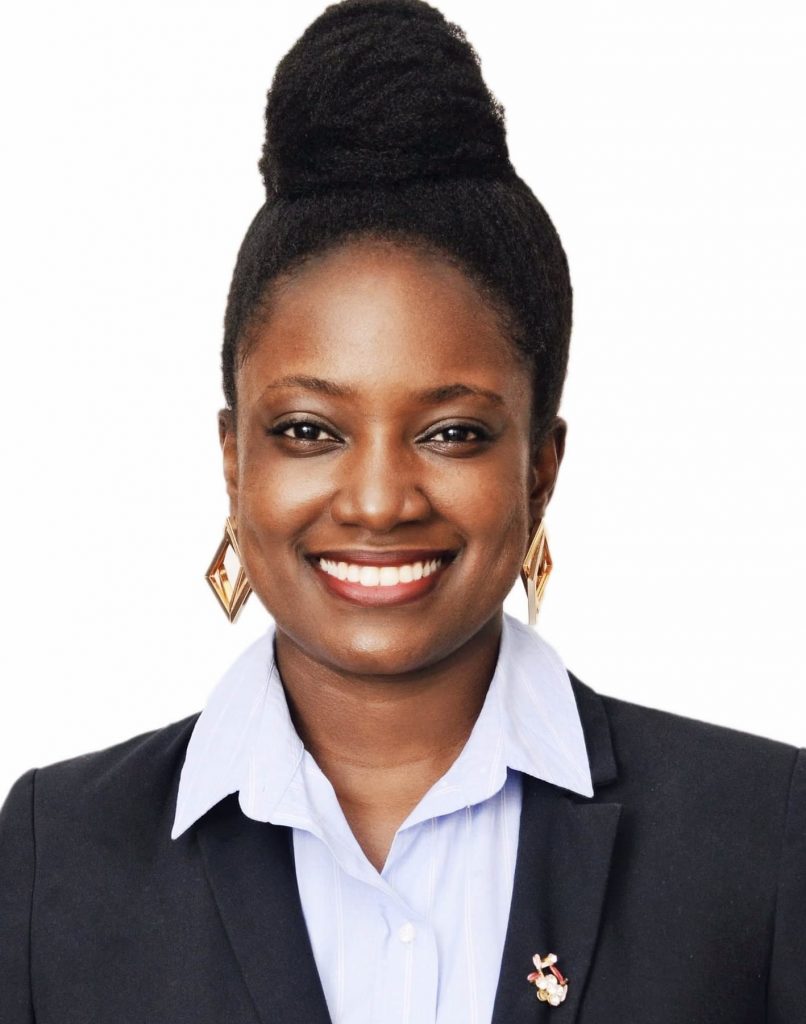
From your perspective, why are youth, youth employment and youth entrepreneurship so important in the Ghanaian context?
One important element is the population demographic. A little over 50% of the population in Ghana is between the ages of 18 and 25. And that creates a huge need for job creation. And one of the things that the Ghanaian government tries to do is to encourage youth entrepreneurship, and young people to start their own businesses due to the unemployment challenge. Moreover, the private sector is one of the key drivers of economic growth worldwide. Hence, with a robust business climate more jobs can be created. So now is a very pivotal time for our economy to have entrepreneurship as a key policy theme, especially for the youth that make up a large percentage of the population.
As the Netherlands Embassy in Ghana, what’s your priority or focus regarding youth?
One of the biggest themes right now out our core sectors of focus i.e. horticulture and cocoa is youth entrepreneurship, employment. Creating jobs for young people through entrepreneurship and skills development is key. Through our private sector initiatives such as developing the cocoa and horticulture value chains, it’s our object to enhance employment for young Ghanaians and support the drive for economic sustainability in the country. The embassy is very dedicated to its youth centred objectives and has also started an initiative called the Youth in Food programme – which is implemented by the Ghana Food Movement. It’s very much youth-focused and encourages people to grow and to consume locally produced food. Moreover, our key flagship programme for youth entrepreneurship, employment and private sector development is Orange Corners.
Orange Corners is our flagship programme for youth employment
Maame Awinador-Kanyirige
I hear a lot of emphasis on food and agriculture here. Why this specific focus?
When we developed our multi-channel strategy for the next 5 years, we looked into what’d be a good sector to focus on as an embassy. To streamline our efforts for the best results, we decided to focus on the horticulture and cocoa sector. Cocoa is a huge trading commodity for the Netherlands and Ghana and horticulture is a key area of expertise for the Netherlands and an opportunity for growth in Ghana. This will also translate into more avenues for Dutch companies, Dutch expertise and know-how to boost trade and investment relations between the Netherlands and Ghana. Likewise, augment development within the Ghanaian economy.
For example one of such initiatives is the Archipelago project in Kumasi, where the TU Delft works with the Kwadaso Agricultural College to develop a curriculum to support farm institutes with the technical expertise which will improve the agriculture sector in Ghana. The objective to develop the cocoa and horticulture value chains will also be very evident in the next Orange Corners subsidy scheme – as we seek to not only support young entrepreneurs in the sector, but also support the entire value chain which will lead to more economic sustainability in these sectors.
How does Orange Corners fit in this strategy?
Orange Corners really fits into our development strategy. Private sector development is core to the goal of supporting economic development in Ghana, including trade and investment relations between Ghana and the Netherlands. We pursue this goal through a combination approach, which fuses trade and development. Providing support which enhances sustainability, self-sufficiency and not total dependence in the long-run goal of mutual partnerships and cooperation.
This strategy is also evident in the Orange Corners Innovation Fund model, which has both a grant and loan component. This approach is to enable entrepreneurs gain sufficient support to improve their businesses and still gain the needed understanding of financial management and loan repayment. Furthermore, it feeds into the Ghana Beyond Aid agenda, in which there’s an objective by the government for the country to be less reliant on aid and develop based on value addition, trade and investment.
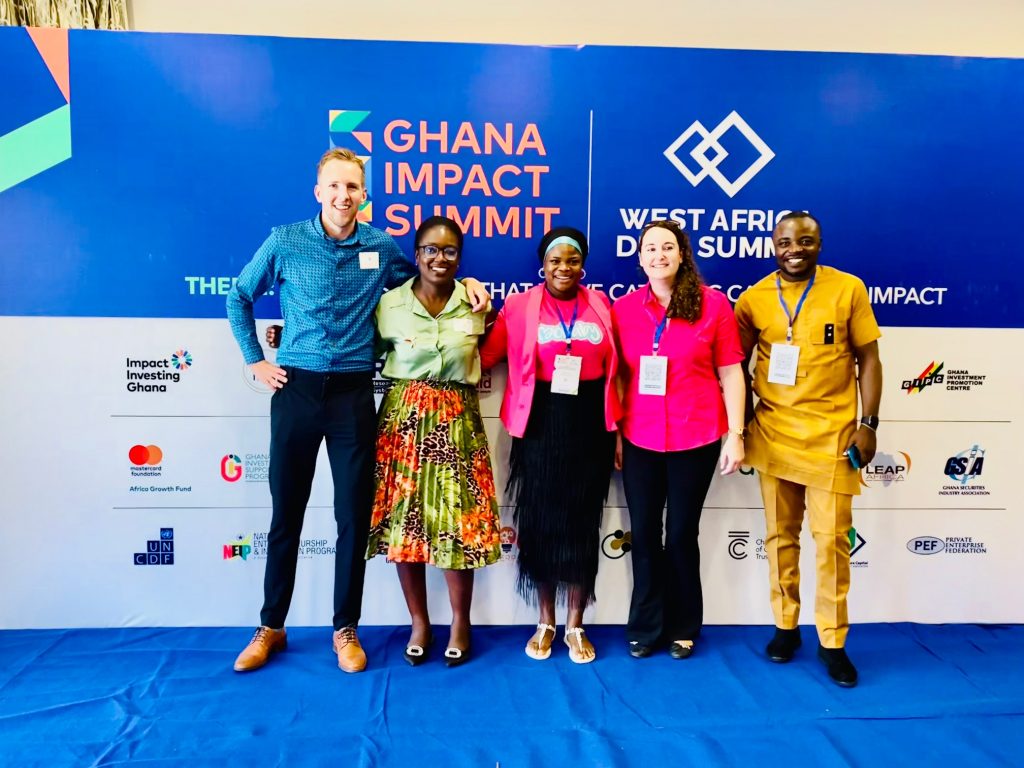
Orange Corners has been active in Ghana for about four years now. How do you evaluate what we’ve done so far?
Orange Corners has helped to build a very important foundation for private sector development which is inclusive and sustainable. Initially, when the programme started the focus was also solely on Accra, but the embassy recognised the need to extend it to other regions. This was to ensure that the entrepreneurial drive is not centralised but rather becomes nationwide. Kumasi, Tamale, Takoradi and Ho were included into the programme, to ensure that entrepreneurs in other regions aren’t left out. Adding to the unique elements of the Orange Corners programme: it’s sector agnostic, and seeks to have a holistic approach to supporting youth entrepreneurship in Ghana.
Orange Corners has helped to build a very important foundation for private sector development in Ghana
Maame Awinador-Kanyirige
Additionally, the follow up component of the programme, where beyond the training there’s still room to support entrepreneurs through funding is momentous. The programme address the access to finance gap in Ghana and takes the necessary steps to sustain its interest in the entrepreneurs long after their training is over. Thus, it’s not like “okay, you’re out, programme is over, you got some funding and you’re done”. But there’s an interest in how they are really doing. This stability is key, even to the combination approach. Because you want to be able to provide strategic support and create success stories which stand the test of time. Strides of such nature are extremely important to the Ghanaian and even global economy as a whole.
Do you already see any success stories in that sense?
I’m still relatively new, so I haven’t had an extensive assessment of previous cohorts, but I’ve heard the stories of some entrepreneurs which have benefitted from the programme and are still up and running till date. For example, companies such as ShaQ Express and a number of others with good sustainable ideas are still in business.
Nonetheless, one can’t ignore the reality of the business ecosystem in Ghana, which still has to develop to a point where its friendly for the private sector and especially SMEs to thrive. There are factors outside the scope of the programme which can derail the efforts of youth entrepreneurship initiatives like Orange Corners. Challenges such as high interest rates, regulations and taxation. The embassy is therefore seeking to collaborate with all stakeholders to support a more enabling environment for business to thrive. Both objectives go hand in hand and though the journey may seem long and arduous, success stories are being built as we go.
Success stories are being built as we go
Maame Awinador-Kanyirige
What would be your advice to Orange Corners to increase impact and improve the programme locally?
I think number one would be looking at the local context, looking at what would work in Ghana. For example standard training can be good, but tailor-made training is always better. I encourage implementing partners or hubs to explore that option more – if they’re not already doing so. After all, we’re not trying to recreate any other business out there, we’re trying to solve local problems. Entrepreneurship is underpinned by providing solutions to a specific context and in this case should solve problems in the Ghanaian economy. The goal of Orange Corners is to look at how to grow these businesses within that context and make them relevant to the environment they’re in, be it nationally, regionally, continentally or globally.
I’d also like to see more collaboration between the Orange Corners programmes across the continent, and even with the Middle East and Asia. It’d be nice to see what the other businesses are doing, promote knowledge sharing and collaboration. Maybe a company here in Ghana could collaborate with a company in Nigeria, have a joint venture. Exploring that option would be great as it’d feed into already existing regional trade and investment initiatives.
And I think it’d also be good to look at how we form partnerships. Right now Orange Corners is country-focused, and it doesn’t look at the option of connecting Dutch companies that want to come to Ghana and enter a sector that maybe an Orange Corners entrepreneur is already active in. We could look at how we can form interconnected partnerships with companies in the Netherlands. Because when it comes to expanding your business, you don’t always want to come and start from scratch. In this way, maybe Orange Corners could even become the model for private sector development here in Ghana. That when a Dutch company comes in, maybe they can find expertise from some of the companies that have gone through the programme. That’d be a nice thing to explore. Because I’ve always gone by this code: you can go faster alone, but we go further together. So I’m really looking forward to seeing more partnerships and business collaborations, joint ventures.. even with large companies and other Orange Corners companies in other countries.
You can go faster alone, but we go further together
Maame Awinador-Kanyirige
I must say so far, I’ve been significantly touched by the people I’ve worked with from RVO on this project. I’ve been so impressed with their passion and my respect for the programme has increased further. And I even wrote online that I’ve been changed by doing this. I’m Ghanaian, and when you see someone who’s not Ghanaian, someone in the Netherlands, who’s passionate about businesses here.. you ask yourself: “Hey, then what is my excuse?” And I’ve been moved so much by that. Especially with the recent West Africa Deal Summit, just seeing the work involved, the team which came and how dedicated they were not just to the work but the entrepreneurs really touched me. So I hope we can keep continuing to form the right partnerships, so that Orange Corners can really reflect the heart behind what RVO does. Because it’s a really powerful movement and I know it’ll make impact over time – as it is already doing anyway!
Follow Orange Corners Ghana online:
Facebook
Twitter
Instagram
LinkedIn
Follow the Netherlands Embassy in Accra, Ghana online:
Website
Facebook
Twitter
Instagram

